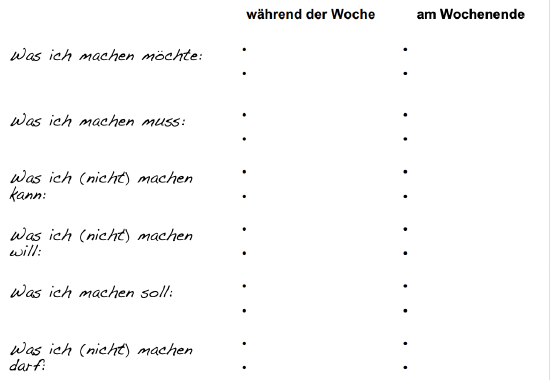4.2: Freizeit
- Page ID
- 109281
Aktivität 1. Was machst du gern in deiner Freizeit?
You already talked a little bit about „Hobbys und Interessen“. Think back and collect as many hobbies and leisure time activities you can think of.

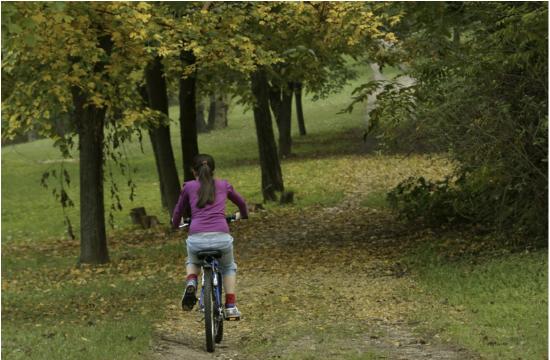
Aktivität 2. Freizeitaktivitäten
A. What do the native speakers and American students like to do in their free time?
Do they have any? A little? A lot? You can find some helpful expressions in the box below. Watch the videos „In der Freizeit” and note which activities each speaker enjoys.
in die Disco gehen – Fahrrad fahren – mit Freunden ausgehen Freunde besuchen oder treffen – Gitarre spielen – schlafen Kaffee – trinken gehen – mit den Katzen spielen – klettern gehen in die Kneipen gehen – lesen – Musik hören – in die Natur gehen – reisen – rudern spazieren gehen – Sport machen – tanzen – in den Berge wandern
Die Deutschen und der Schweizer
Berna
Eva
Harald
Jan
Peter
Die amerikanischen Studenten
Adan
Hassan
Erin
Sara
Sophia
B. Weitere Aktivitäten
You are already familiar with a handful of the free-time activities mentioned by the speakers from earlier chapters:
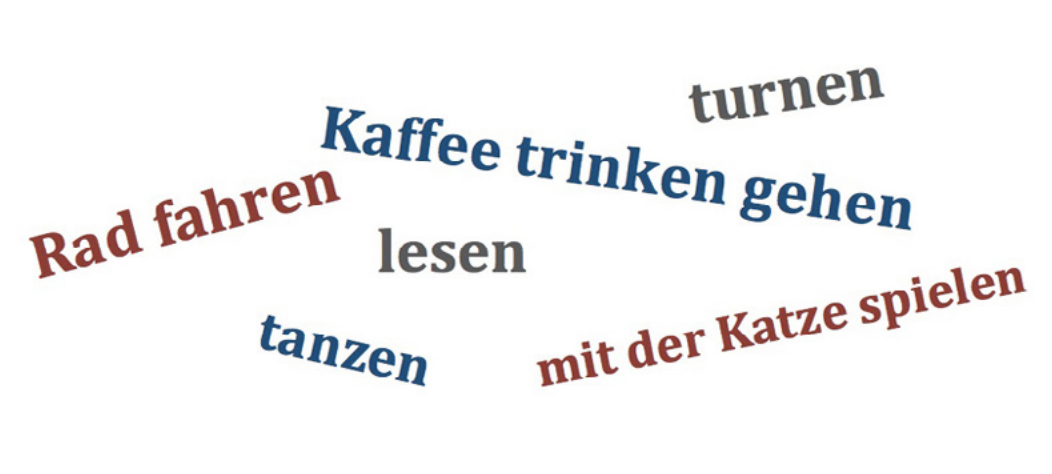
However, there’s also a lot of new vocabulary. Use your best guessing skills to see if you can figure out what this new vocabulary refers to. Write the letter of each English term in the right column below next to its corresponding German term in the left column.
in die Disco gehen ___________________ a. to play guitar
mit Freunden ausgehen ___________________ b. to do sports
Freunde besuchen oder treffen ___________________ c. to travel
Gitarre spielen ___________________ d. to listen to music
klettern gehen ___________________ e. to go to a club
in die Kneipe gehen ___________________ f. to row
Musik hören ___________________ g. to go to a bar
in die Natur gehen ___________________ h. to hike in the mountains
reisen ___________________ i. to visit or meet friends
rudern ___________________ j. to go climbing
spazieren gehen ___________________ k. to go out with friends
Sport treiben ___________________ l. to go into nature
tanzen ___________________ m. to go walking
in den Bergen wandern ___________________ n. to dance
Zum Nachdenken: In the last exercise, Eva mentions Kaffee trinken gehen as one of her free-time activities. What is the difference between Kaffee trinken gehen and just plain Kaffee trinken? When would you use each of these? As you may have noticed, when using Kaffee trinken gehen, the verb gehen is conjugated rather than the verb trinken. Keep this rule in mind as you progress through this chapter – it will come in handy, especially when we talk about the different sports!
Aktivität 3. Jetzt bist du dran!
How much free time do YOU have at the moment? When do you have free time? How do you spend it?
Wie viel Freizeit hast du?
Im Moment habe ich ________________________________________ Freizeit.

Wann hast du Freizeit?
Ich habe __________________________________Freizeit.
... morgens/nachmittags/nacht
... montags/dienstags/mittwochs/donnerstags/freitags/samstags/ sonntags
... freitagabends
... am Wochenende
... um 3 Uhr
Was machst du gern in deiner Freizeit? In meiner Freizeit ...
Weitere populäre Freizeitaktivitäten: Computerspiele spielen • Kleidung kaufen • fernsehen • Football spielen • jagen • Karten spielen • ins Kino gehen • kochen • ins Konzert gehen • malen • schwimmen • ins Theater gehen • zeichnen
Aktivität 4. Eine kleine Reportage: Das Wochenende
One of the greatest sources of free time is the weekend! In this activity, you will be conducting a survey with your classmates, but you need to devise some questions beforehand.

A. Was machst du am Wochenende?
Work together with a partner to find out what s/he usually does on the weekend. Before you interview him/her, you’ll of course need some questions to ask! With your partner, develop five questions you could ask each other about what you usually do on the weekends. These w-words should be useful:
Wann? • Was? • Wie lange? • Woher? • Wo? • Wohin? Warum? • Wessen? • Wie viel? • Wieso? • Wie viele?
Beispiele: Wie lange schläfst du am Samstagmorgen? Wohin gehst du am Wochenende essen?
Fragen zum Interview:
Frage #1:
Frage #2:
Frage #3:
Frage #4:
Frage #5:
B. Ein kleines Interview
Now turn your interview questions on each other (after all, you and your partner count as subjects too!). Jot down your partner’s responses in the space below.
Antworten zum Interview:
Antwort #1:
Antwort #2:
Antwort #3:
Antwort #4:
Antwort #5:
C. Reportage
Now report back to your instructor what you’ve learned about your partner.
Beispiele: Mein Partner/meine Partnerin schläft bis 10 Uhr samstags morgens. Mein Partner/meine Partnerin geht jedes Wochenende ins Sportzentrum.
Aktivität 5. Was machen Studenten am Wochenende?
A. Die Ergebnisse
Based upon Aktivität 4 above, collect (as a class) a list of the most common responses. Then decide which responses deserve to be in the Top-10 list (à la David Letterman) of activities students do on the weekend. Rank them from 10 to 1, with 1 (the last item) being the “best” response, of course.
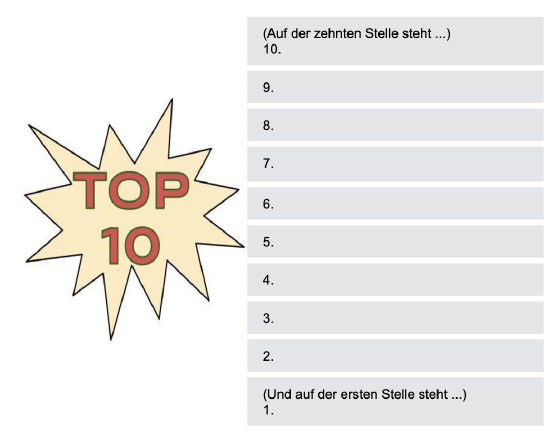
B. Studenten am Wochenende
What do typical students do on the weekend? Write 4-5 statements describing what they do.
Beispiel: Typische UT-Studenten sehen am Wochenende viel fern.
Aktivität 6. Während der Woche versus am Wochenende
How does your lifestyle during the week differ from your lifestyle on the weekend?
A. Look at the word bank below and write each activity into the column that best reflects your schedule:
Which activity do you do während der Woche and which am Wochenende?
ausgehen – Besorgungen machen – fernsehen – Freunde treffen Hausaufgaben machen – ins Internet gehen – Bücher lesen – in den Bergen wandern – viel schlafen – Sport machen – in die Stadt fahren zum Unterricht gehen
B. Now ask a partner what they are (not) doing on the weekend, using the same questions you answered above.
Write down the questions you need to ask him/her. It is your friend/classmate – what form do you use to address friends?
Was musst du am Wochenende tun?
Was sollst du am Wochenende tun?
______________________________?
_________________________________ ?
______________________________?
_________________________________ ?
______________________________?

Aktivität 7. Eine perfekte Woche
What would you do if you could plan the perfect week for yourself? Jot down ideas of all the activities you would want to do.
A. What activities do you want to do?
Select the answers given below or write down your own ideas. Choose at least eight activities.
• schwimmen
• einkaufen gehen
• faulenzen
• Hausaufgaben machen
• ________________________________________________
• ________________________________________________
• ________________________________________________
• ________________________________________________
• ________________________________________________
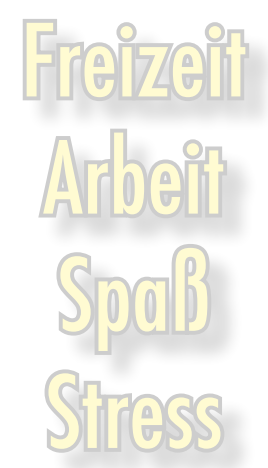
B. When do you want to do what?
Create a plan for your perfect week. Write down the activities and the time you plan to do them.
| Montag | Dienstag | Mittwoch | Donnerstag | Freitag | Samstag | Sonntag |
C. Your perfect week is just about to get even more perfect
A friend of yours wants to spend some time with you. Talk with a partner and find out what activities the other person is doing when (do not look at each other’s schedules, try to talk through this exercise). See if there is an activity you both would like to do, and find a time when you can both do it (you might need to compromise).
First, think about the questions you need to ask your partner and write them down.
Beispiel: „Was willst du machen?” oder „Wann möchtest du das machen?” oder „Was willst du am Montag machen?” usw.
D. Was mein Partner machen möchte
Take notes on your partner’s schedule, then circle the activity you want to do together.
| Montag | Dienstag | Mittwoch | Donnerstag | Freitag | Samstag | Sonntag |
Aktivität 8. Wohin kann man gehen?
Where can one go to do the following activities? Some possible destinations are provided below in the word bank. (There is certainly more than one possible destination for each activity, and of course each destination may be used more than once).
(zum) Biergarten (auf die) Kirmes (in den) Park (ins) Café (in die) Kneipe (ins) Restaurant (zur) Dönerbude (ins) Konzert (ins) Theater (ins) Einkaufszentrum (ins) Museum (zur) Vorlesung (ins) Kino (in die) Oper
Beispiel: Wenn man spazieren gehen möchte, kann man ...in den Park gehen
1. Wenn man ein Bier trinken möchte, kann man ... ___________________________________________________________________ .
2. Wenn man gute Musik hören möchte, kann man ... ___________________________________________________________________ .
3. Wenn man einen Film sehen möchte, kann man ... ___________________________________________________________________ .
4. Wenn man einen Döner essen möchte, kann man ... ___________________________________________________________________ .
5. Wenn man eine Pizza essen möchte, kann man ... ___________________________________________________________________ .
6. Wenn man Kleidung kaufen möchte, kann man ... ___________________________________________________________________ .
Aktivität 9. Was magst du lieber?
What is your Vorliebe (preference), American Football or deutschen Fußball (soccer)? Opera or hard rock? Why? Find all the answers to these questions below:
A. Partnerarbeit
With a partner, take turns asking which of the items below you prefer. Jot down some notes on your partner’s responses and be prepared to share them with the class.
Beispiel:
S1: Magst du lieber Rap oder Rock?
S2: Ich mag lieber Rock. Und du?
S1: Ich mag lieber Rap.
Magst du lieber ...
1. Tee oder Kaffee?
2. Basketball oder Football?
3. Filme oder Theaterstücke?
4. Schach (chess) oder Poker (oder weder ... noch ...)?
5. Pizza oder Hamburger?
6. Bücher oder Zeitschriften (magazines)?
7. wandern (hiking) oder spazieren gehen (going on walks)?
Do you and your partner have things in common or do you like mostly different things? Wir sind total verschieden! Wir haben die gleichen Vorlieben!
B. Warum?
Why do you prefer certain things over others? Think about reasons for your decisions:
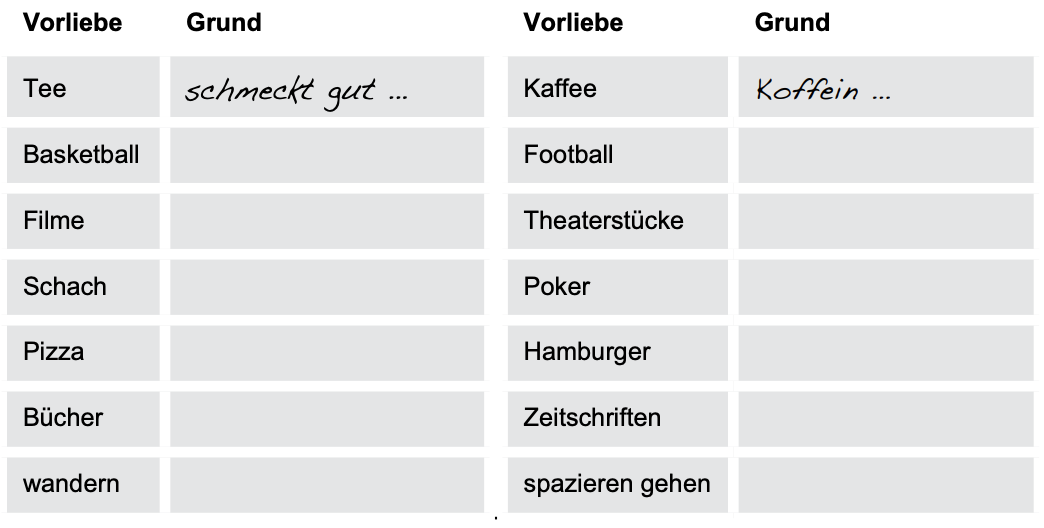
C. We have now collected many reasons why you might prefer one thing over the other.
How did you respond to these questions above? Now use the coordinating conjunction denn to explain why you responded as you did. Write complete sentences. Explain at least 4 Vorlieben.
Beispiel: Ich mag lieber Kaffee, denn ich brauche immer viel Koffein (caffeine). Ich gehe lieber spazieren, weil es ruhiger ist.
1. ______________________________________________________________________ .
2. ______________________________________________________________________ .
3. ______________________________________________________________________ .
4. ______________________________________________________________________ .
Aktivität 10. Eine Verbesserung
Now revisit Aktivität 6 about what you have to/like to do during the week and on the weekend. Read your paragraph and decide where it might be possible to incorporate coordinating conjunctions: aber, denn, oder, sondern, und.
A. In the space provided below, rewrite your paragraph using these conjunctions
This will make your writing sound more sophisticated!
B. Help your peers
Share your paragraph with a partner. Read each other’s paragraph and give suggestions on how to improve the writing. This will not only benefit your partner but will also help you because you have to think about how to communicate your ideas for an actual audience! In the space below write down some of the suggestions.
Aktivität 11. Kleidung kaufen
In Kapitel 3, we discussed shopping for groceries and other odds and ends. Now we discuss a kind of shopping which, for many people, is quite a hobby! Watch the following „Kleidung kaufen” video clips and take notes about how Berna, Eva, Harald, Erin and Sara go shopping for clothes and answer the questions below.
1. Wie oft geht Berna Kleidung kaufen? ________________________________________________________________________
2. Wohin fährt Eva, wenn sie Kleidung kaufen möchte? ________________________________________________________________________
3. Wer kauft Kleidung im Internet? ________________________________________________________________________
4. Wo kauft Harald seine Kleidung? (use the preposition bei ) ________________________________________________________________________
5. Was kaufte (bought) Erin das letzte Mal? ________________________________________________________________________
6. Wessen Lieblingsläden sind Galeria Kaufhof und H&M? _________________________________________________________________________
Aktivität 12. Einkaufsgewohnheiten – Ein kleines Interview
Ask two of your classmates about their shopping habits – how often they buy clothes, how much money they spend each month on clothing, where they go and what their favorite store is.
| Name | ||
|
Wie oft gehst du Kleidung kaufen? ... jede Woche natürlich! ... einmal im Monat. ... zweimal im Jahr. ... nur wenn ich absolut muss. |
||
|
Wie viel Geld gibst du jeden Monat für Kleidung aus? ... meinen ganzen Gehaltsscheck (paycheck). ... nicht sehr viel. ... höchstens $20 im Jahr. |
||
|
Wo kaufst du am liebsten Kleidung? ... in der Stadt. ... im Einkaufszentrum. ... im Internet. |
||
| Was ist dein Lieblingsgeschäft? |
Aktivität 13. Wie heißen die Kleidungsstücke?
A popular place to shop for clothes in the German-speaking countries is H&M, the Swedish department store which prides itself on its fashionable clothing and affordable prices. Do you know it?

A. Die Umkleidekabine
Go to the German H&M website at http://www.hm.com/de/ and ‘shop til you drop.’ (But don’t actually buy anything). Browse H&M’s offers and pay attention to new vocabulary. Then look at the drawings below and try to find similar items on the website. Does H&M sell what you would need to dress like this?
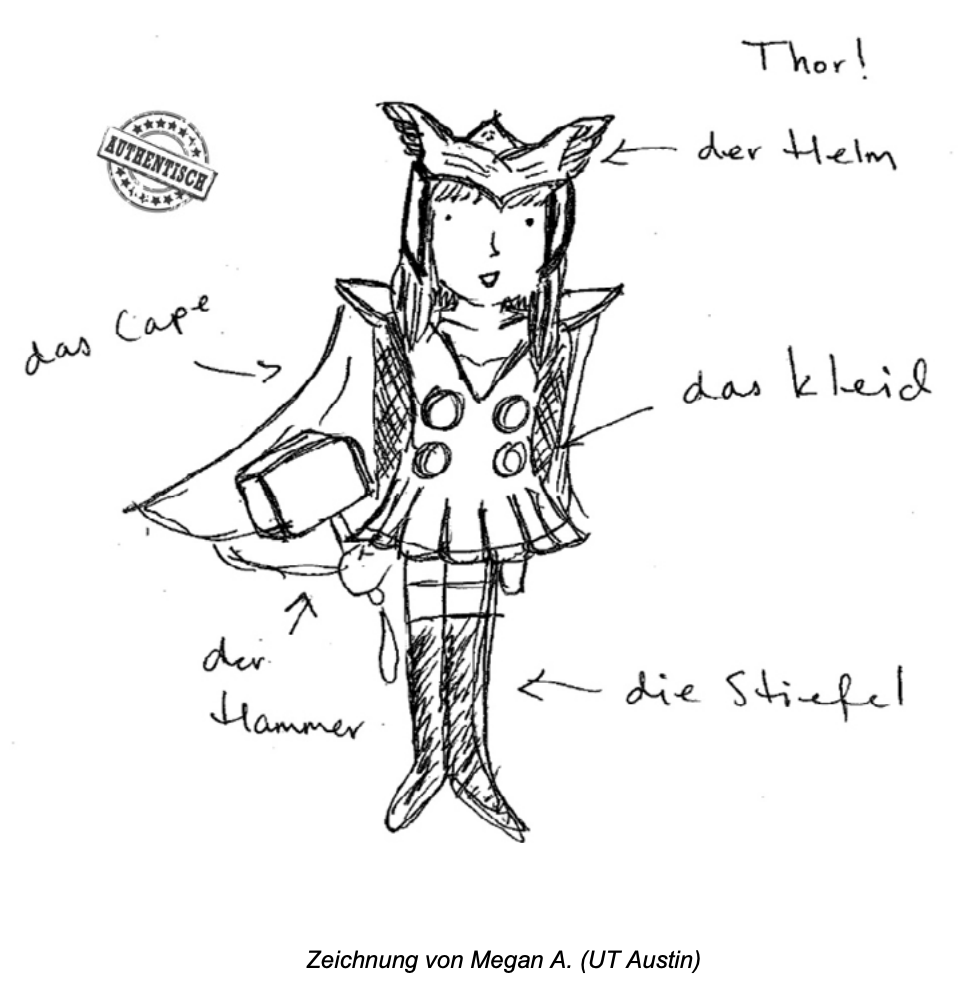
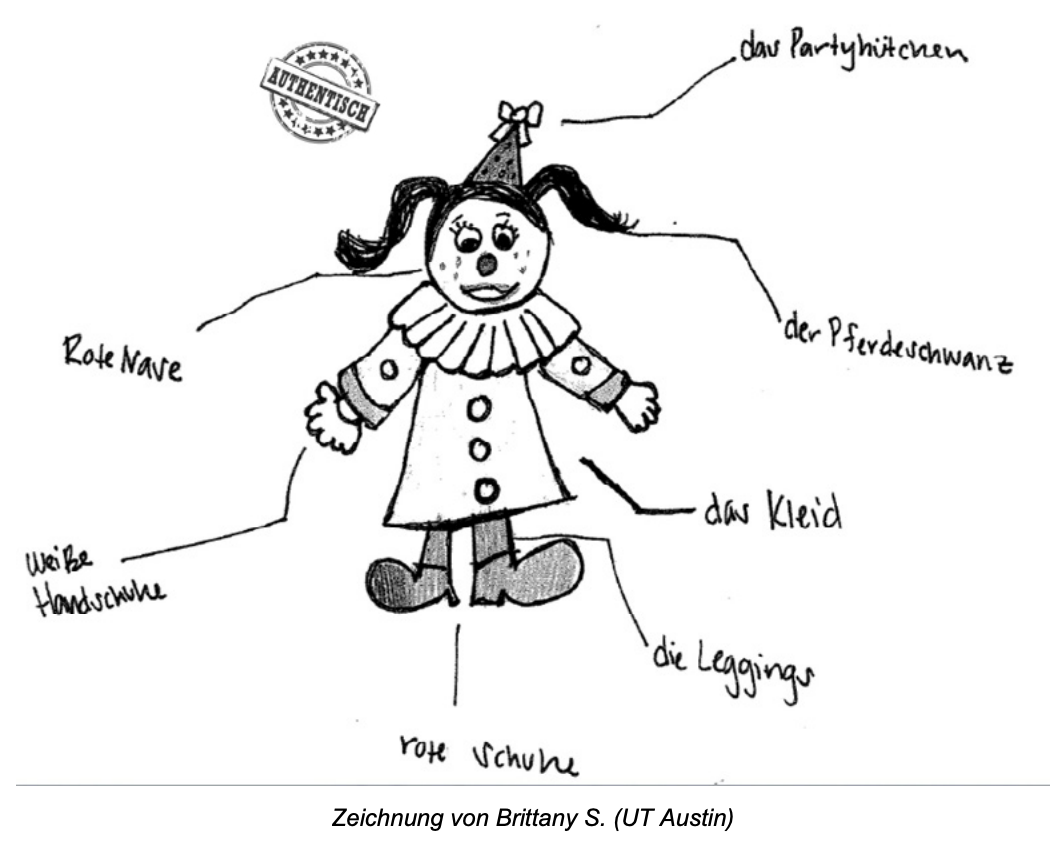
B. Sonstige Kleidung
Can you guess the meaning of some other common items of clothing? Match each clothing item on the left with its English equivalent on the right. Then go to the next page and try to fill in the blanks on the last student drawing. You can also draw your own fanatsay outfit and label the items you will need. In case your class loves fashion, have a contest for the best drawing/labeling work!
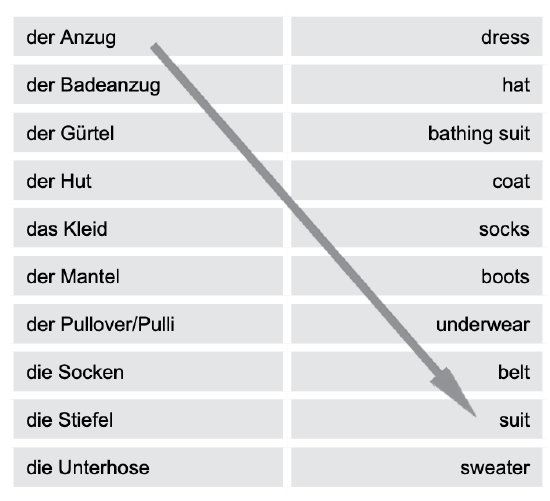

Aktivität 14. Alles durcheinander!
You are an exchange student in Germany and you need more money. You decide to take on a part time job at a department store. As you get to work today everything is a big mess and you need to sort it out. What clothing item does not belong with the others? Write down the correct word for each clothing item, mark the one that does not fit, and explain why that item is different.
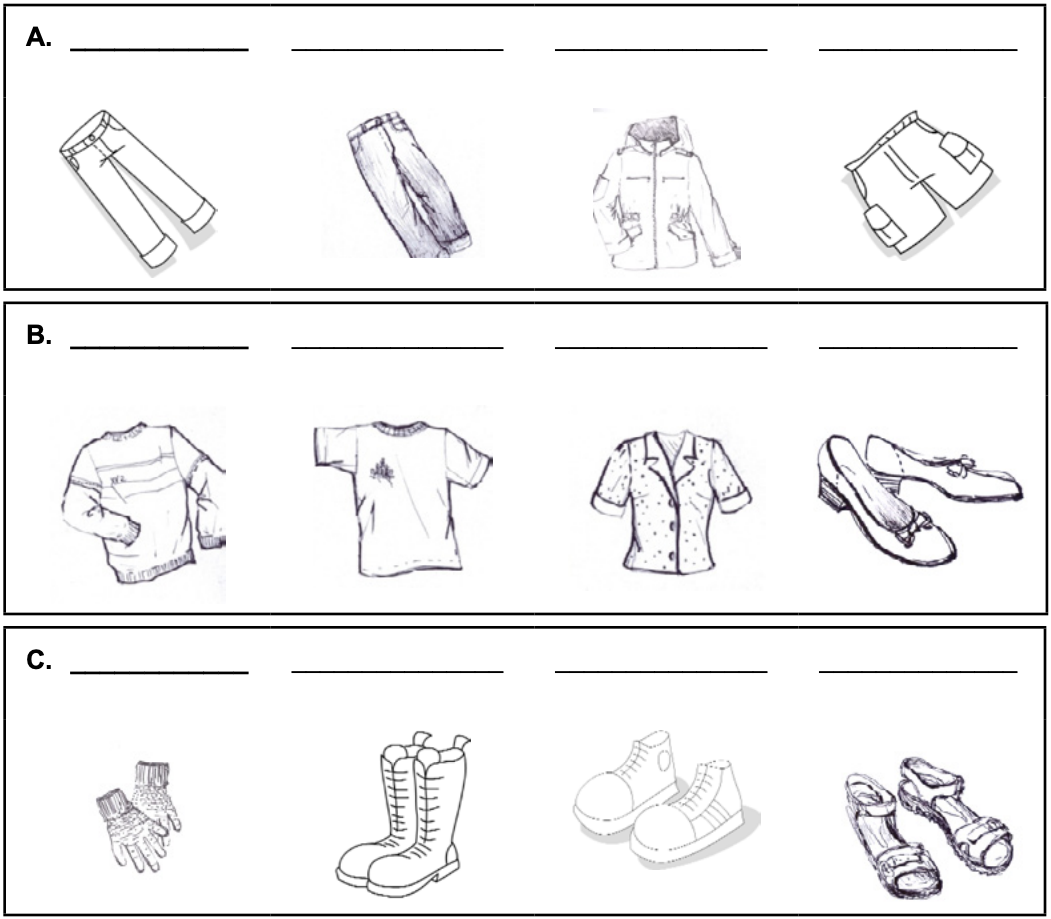
Aktivität 15. Was trägt mein Lieblingsstar?
Find a picture of your favorite movie or music star. Label the articles of clothing they wear, and write one sentence about each item. Is her hat altmodisch (old-fashioned), hässlich (ugly) or nicht modisch (unfashionable)? Or is it modisch (fashionable), schick (chic) or schön (nice, pretty)? Present your star to the rest of your class.
Aktivität 16. Ratespiel
On a small sheet of paper, describe your own outfit. Be as specific as possible: mention articles of clothing, their colors and whether they are schick or bunt. Afterwards your teacher or a student can read off the descriptions all the students wrote, and the rest of the class has to guess who is being described.
Beispiel: Ich trage einen Pullover. Der Pullover ist grün und sehr bequem ...
Aktivität 17. Was trägst du wo?
What would you wear at the following locations or take with you? Be as specific as possible.
Zum Wandern trage ich ...
Beim Camping trage ich ...
Zum Strandurlaub nehme ich ... mit.
Im Skiurlaub trage ich ...
Auf einem Rockkonzert trage ich ...
Aktivität 18. Einkaufen online
At home, log onto the Internet and visit Peek/Cloppenburg (http://www.peek-cloppenburg.de) oder H&M (http://shop.hm.com/de/). Imagine that you received a 250 Euro Gutschein (gift card) zum Geburtstag. You need to buy some new clothing. Was kaufst du? Wie sehen diese Kleidungsstücke aus? Take notes and present your items to a partner. He/She draws your items. Did she/he get it right?
Aktivität 19. Interviews: Die beste Musik
Begin by reading the different musical preferences in the left column below. Then watch as the native and non-native speakers of German discuss the types of music they like to listen to. Can you identify which musical preferences belong to each speaker? (The preferences are listed out of order, of course ☺) You may need to watch each video a second time to complete the activity.
Er mag Rap-Musik und deutschsprachige Musik. __________________
Er mag amerikanischen Rock, Folkmusik, Jazz und Blues. Er mag aber auch deutsche Musik, zum Beispiel deutschen Rock und Hip-Hop. __________________
Sie mag besonders gern Musik aus den 70er Jahren, zum Beispiel Disco, denn sie tanzt sehr gern. __________________
Sie mag viel Musik, aber kein bestimmtes Genre. __________________
Er mag klassische Musik und klassischen Rock ‘n’ Roll, zum Beispiel die „Rolling Stones“, die „Beatles“, Eric Clapton und Beethoven. __________________
Sie mag klassische Musik, aber sie hört alles gern. __________________
Er mag jede Musik, aber am besten gefallen ihm klassische Musik und Hip/Hop. __________________
Sie mag alles außer (except for) Techno. Sie ist ein großer Fan von Country. __________________
Sie mag fast jede Musik, aber sie hört meistens Bluegrass, denn sie spielt Banjo. Sie mag auch klassische Musik, Jazz und Blues. __________________
Er hört gern klassische Musik, zum Beispiel Bach und Beethoven. Er mag aber auch neue Musik wie Jazz oder Rhythm and Blues. _________________
Aktivität 20. Welche Musik hörst du gern?
Now that you know the names of the different musical categories, take turns asking your partners (two other students) questions about his/her musical tastes. Ask at least one additional question of your own!
| Namen der Partner: | S2: | S3: |
S1: Welche Musik hörst du gern?
S2: Ich höre gern ...
S3: …
S1: Wer ist dein Lieblingssänger/deine Lieblingssängerin/deine Lieblingsgruppe?
S2: Mein Lieblingssänger/meine Lieblingssängerin/meine Lieblingsgruppe ist ...
S3: …
S1: Welche Musik hörst du nicht gern?
S2: Ich höre nicht gern ...
S3: …
S1: ____________________________________________________________?
S2: ____________________________________________________________.
S3: ____________________________________________________________.
Aktivität 21. Musik machen – Eine Umfrage
Most people have played music at some point in their lives, and many people continue to play music on a regular basis. Go around the room and interview your classmates as to whether they play or used to play an instrument. Have them sign their names next to the appropriate line(s) below. Who knows – maybe you’ll find the members of your new band right here in German class!
Beispiel: S1: Spielst du ein Instrument, oder hast du früher ein Instrument gespielt? S2: Ja, ich habe früher Klarinette und Klavier gespielt.
Wer spielt Posaune (oder hat Posaune gespielt)? ___________________________
Wer spielt Flöte (oder hat Flöte gespielt)? ___________________________
Wer spielt Geige (oder hat Geige gespielt)? ___________________________
Wer spielt Gitarre (oder hat Gitarre gespielt)? ___________________________
Wer spielt Klarinette (oder hat Klarinette gespielt)? ___________________________
Wer spielt Klavier (oder hat Klavier gespielt)? ___________________________
Wer spielt Schlagzeug (oder hat Schlagzeug gespielt)? ___________________________
Wer singt (oder hat gesungen)? ___________________________
Wer spielt Trompete (oder hat Trompete gespielt)? ___________________________
Aktivität 22. Ein kleines Musik-Referat
Pick one of your favorite singers, bands, composers, or instruments. Prepare a short oral report (2-3 minutes) to give in class on this topic. Be sure to bring pictures and/or short clips of music to spice up your talk! (You’ll have access to a stereo and/or the Internet.) For your presentation, you should only use index cards with facts and prompts, but do not read the entire speech (booooring!)
Mein Thema:
Wichtige Details:
Aktivität 23. Lieder & Musik
The band Sportfreunde Stiller is a German Indie-Rockband. They met while studying Sportwissenschaften at the University in Munich and they are all big Fußballfans. In 2008 they released a new album You Have to Win Zweikampf. The entire album is about soccer. One of the more famous songs is Auf dem ganzen „54, 74, 90, 2006“ and its adaption „54, 74, 90, 2010“. Check out their website http://www.sportfreunde-stiller.de.
1. Beim ersten Hören/Sehen (During the first listening/watching)
a. Listen to one of the versions: What do you think the song is about? What do you notice?
2. Beim Lesen (While reading)
a. Lesen Sie beide Versionen und markieren sie alle Unterschiede im Text. (Read both versions very carefully and mark all difference you find.)
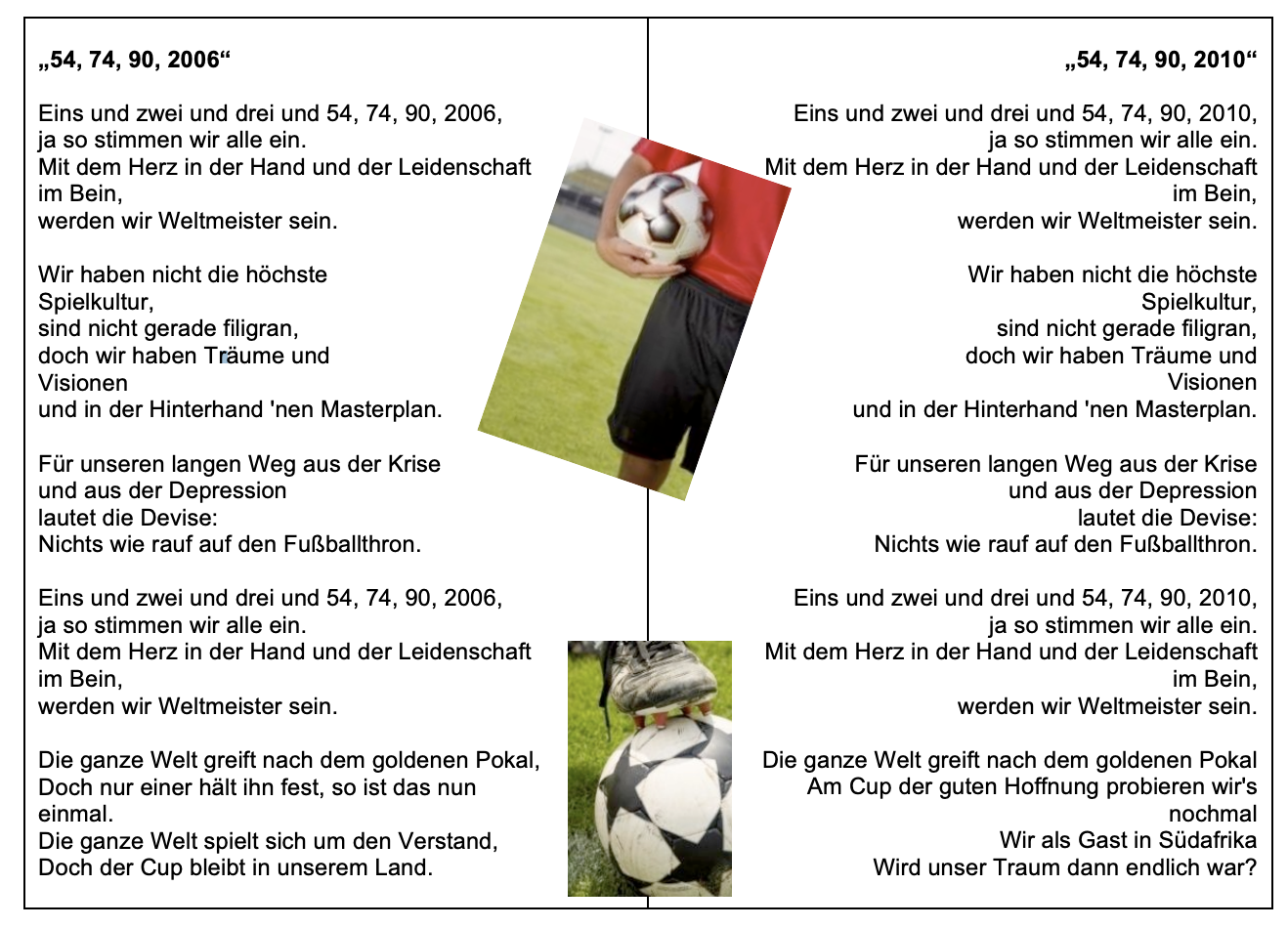
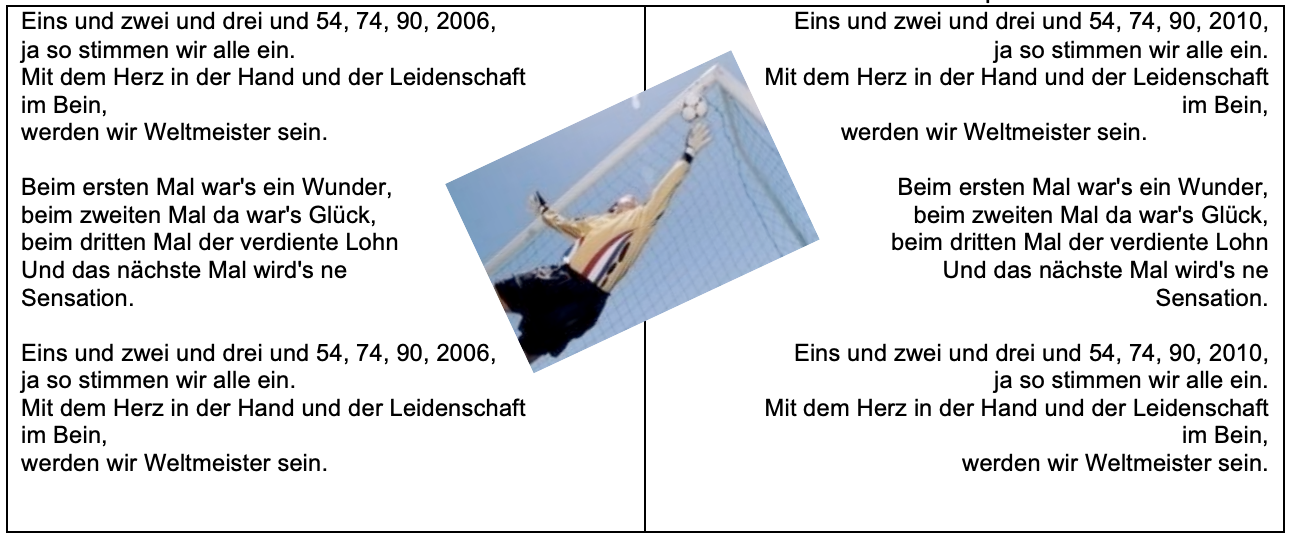
b. Refer to both versions and write out the numbers of both version (first numerical then spelled out).
Version 1:
_______ = ______________________________________________________
_______ = ______________________________________________________
_______ = ______________________________________________________
_______ = ______________________________________________________
Version 2:
_______ = ______________________________________________________
_______ = ______________________________________________________
_______ = ______________________________________________________
_______ = ______________________________________________________
c. What do you think the numbers and differences in numbers mean (Bedeutung)?
Bedeutung:________________________________________________________________________ _________________________________________________________________________________ _________________________________________________________________________________ _________________________________________________________________________________
3. Weitere Fragen (further questions)
a. What does the metaphor “den Fußballthron besteigen” mean? Hint: einen Berg besteigen
b. What do you think the metaphor “die Leidenschaft im Bein haben” means?
Hint: Leidenschaft = passion
Aktivität 24. Die Sportarten
For the more active among us, sports are a great hobby! When it comes to the German names of some common sports, you’re in luck – you already know half of them, whether because they are exactly the same as they are in English, or because you learned them earlier in the chapter! These sports include:
Baseball • Basketball • Football Golf • Jogging • Karate • Mountainbike fahren • Rudern Turnen • Volleyball • Wandern
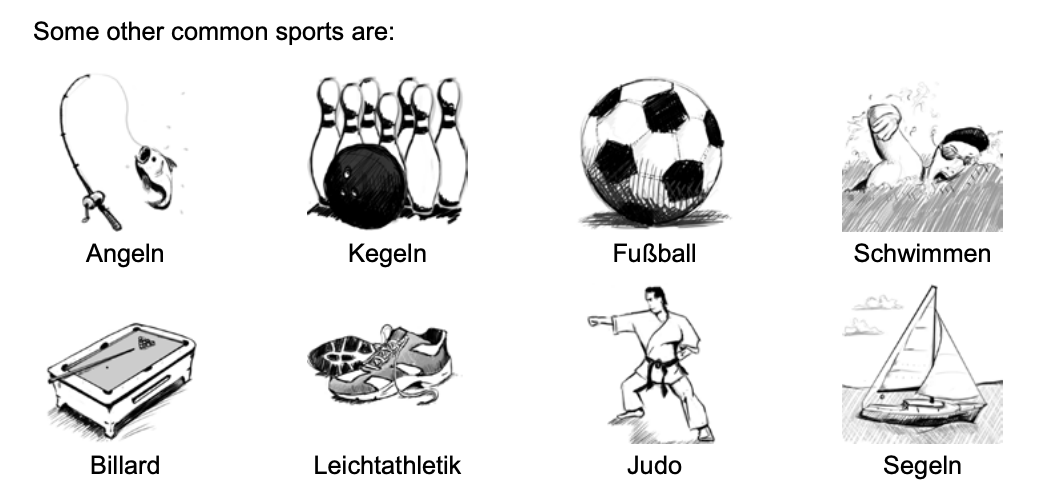
Aktivität 25. Ein Kreuzworträtsel
Practice using your new sports vocabulary by completing the crossword puzzle below! The across words are numbered 1-7 from top to bottom, and the down words are numbered 1-7 from left to right. Also, you will need to write out the letter ß as ss. Viel Spaß!
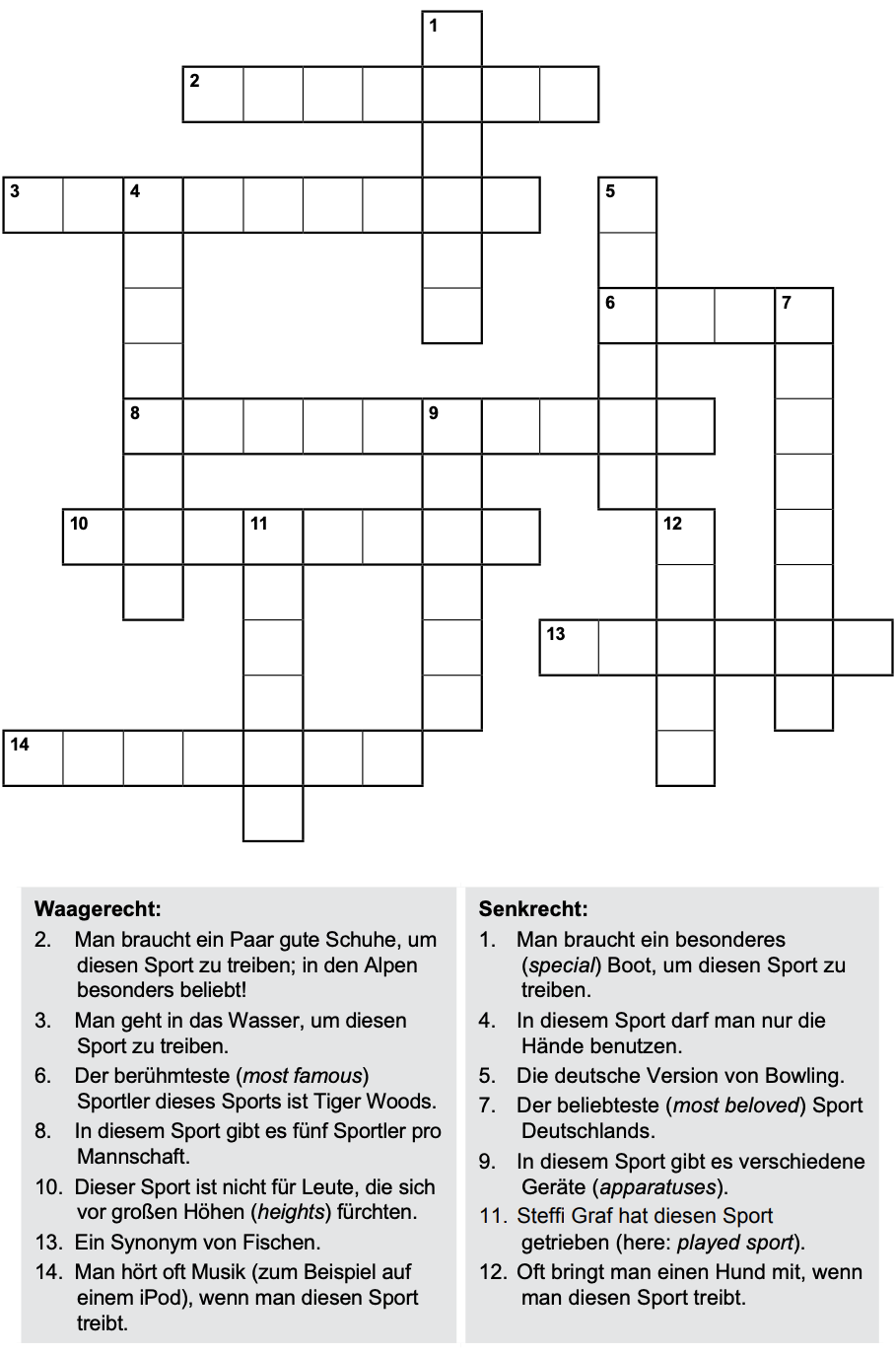
Aktivität 26. Treiben Jan und Eva Sport?
Jan and Eva represent two opposite ends of a spectrum when it comes to doing sports. Watch the video clips, “Sport treiben” and fill in the blanks with the missing information to learn about their exercise habits.
Jan
Ich treibe im Moment __________________ Sport, und ich bin sehr unzufrieden (dissatisfied) damit. Eigentlich würde ich gerne __________________ Sport treiben. Zum Beispiel ________________ würde ich gerne machen oder auch mal ________________ spielen oder ___________________. Aber es ist im Moment für mich schwer, das irgendwie in meinen _______________________________ einzubringen. Aber in der Zukunft (future) würde ich gerne ____________ machen.
Eva
Ich gehe _____________ die Woche _______________ zum Sport. Montag bis Mittwoch ist das eineinhalb Stunden. Donnerstags sind’s ______________ bis ______________ Stunden. Ich __________________ selbst, ich gebe Kinderturnen. Das heißt, wir ______________ mit denen in der Turnhalle ‘rum, über die Kästen (boxes), über die Pferde (horses), auf den Matten, Trampolin springen, solche Sachen ...
Aktivität 27. Über Sport sprechen
A. Treibt dein Partner Sport?
Ask a partner the following questions about what sports they like, and circle the responses he/she gives you. Write down any additional information they give you, too!
| Treibst du Sport? | Ja/Nein. |
| Was für Sport treibst du? |
Ich spiele ... Baseball • Basketball • Billard • Football • Fußball • Golf • Tennis • Volleyball Ich mache ... Karate • Leichtathletik Ich gehe ... joggen |
Ich angele. ODER Ich gehe angeln.
Ich fahre Mountainbike. ODER Ich gehe Mountainbike fahren.
Ich kegele. ODER Ich gehe kegeln.
Ich klettere. ODER Ich gehe klettern.
Ich rudere. ODER Ich gehe rudern.
Ich schwimme. ODER Ich gehe schwimmen.
Ich segele. ODER Ich gehe segeln.
Ich turne.
Ich wandere. ODER Ich gehe wandern.

B. Ein kurzer Bericht
Using the notes you took on your partner’s responses, write a paragraph of 5-6 sentences that discusses his or her involvement in sports (including what kind of sports he or she participates in and how often).
Aktivität 28. Wie findest du ...?
Now that you’ve learned all about the different hobbies, how do you really feel about them? For each sentence below, select the adjective(s) which, in your opinion, best describe the hobby. You may, of course, use each adjective more than once!
| eher positiv | kann positiv oder negativ sein | eher negativ |
| entspannend gesund kreativ lustig spannend unterhaltsam | interessant langsam verrückt | gefährlich langweilig schwierig teuer |
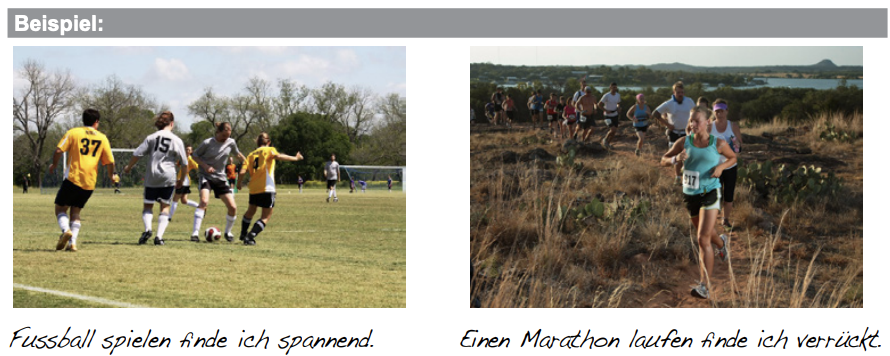
1. Ins Museum gehen finde ich _____________________________________________.
2. Moutainbike fahren finde ich _____________________________________________.
3. Monopoly spielen finde ich ______________________________________________.
4. Zeichnen finde ich _____________________________________________________.
5. Briefmarken sammeln (stamp collecting) finde ich ____________________________.
6. Musik hören finde ich ___________________________________________________.
Web-Tipp: Go to Yahoo’s Eurosport report at http://de.eurosport.yahoo.com/
1. What are today’s featured sports-stories in the news? 2. Are there similar websites available in your own country? 3. What are some similarities and differences between those websites and the Eurosport one?
Spaß am Abend!
Aktivität 29. Ins Restaurant gehen
Surely one of the most enjoyable uses of evening free time is going out to eat. You don’t have to cook, and you get to have exactly what you want! Or so you think. It can be very difficult to satisfy an entire group of people when deciding on a location – you may not get what you want!
A. Wohin gehen wir heute Abend?
Your instructor will divide the class into groups of three to four. Imagine that your group will be going out to dinner tonight, and create a 4-5 minute dialogue in which you are trying to decide where to go so that it makes everyone happy. The following notes can help you get started with your dialogue.
| Name | |||
|
Wo gehst du gerne essen? ... in den Biergarten. ... ins Café. . .. zum Chinesen. ... zur Dönerbude. ... zum Gasthaus. ... zum Griechen. ... zum Inder. ... zum Italiener. ... zum Japaner. ... zum Mexikaner. ... zur Pizzeria. ... zur Pommesbude. |
|||
| Wo gehst du nicht gerne essen? | |||
| Bist du Vegetarier oder Vegetarierin? | |||
| Wie viel Geld möchtest du ausgeben (to spend)? |
Ideen zum Dialog (instead of writing out the entire dialogue, just jot down prompts and ideas):
B. Wohin gehen die anderen?
After all groups have finished planning their dialogues, your instructor will call each group up to perform it in front of the class. Take notes on all the groups: Wohin gehen sie? Wie viel Geld möchten/wollen/können sie ausgeben?
Aktivität 30. Auswärts essen.
The following passage is taken from a manual published by the Deutscher Akademischer Austauschdienst (DAAD) in Germany. Can you figure out what it’s about?
A. Vor dem Lesen
Look at the title „Kulinarisches” and subheading „Auswärts essen” of the passage below.
1. What do you think the passage is about? Write down your ideas.
________________________________________________________________________ ________________________________________________________________________ ________________________________________________________________________
B. Bei dem Lesen Begin by reading the first two sentences of the passage (starting with „Es stimmt schon ...”).
1. Who might be the intended audience of this passage? _________________________________________________________________________
2. Where might you find this passage (i.e., in what kind of materials)? _________________________________________________________________________
3. Now read the rest of the passage, using the vocabulary gloss as necessary!
Kulinarisches
Es stimmt schon: In Deutschland essen viele Menschen gerne deftig. Aber keine Angst, Sie müssen sich während des Studiums nicht ausschließlich von Sauerkraut, Bratwürsten und Grünkohl ernähren.
deftig: hearty
sich... ernähren: to subsist (on)
Auswärts essen
Es gibt kaum eine Landesküche, die Sie in größeren Städten nicht finden. Ob persisch, thailändisch, russisch, mexikanisch oder koreanisch – das Angebot an Restaurants in Deutschland ist groß. Sehr beliebt sind bei Studierenden auch die italienischen, griechischen und türkischen Lokale, weil man hier oft für wenig Geld satt wird. Andere schwören auf den Lieferservice, den viele Pizzerien, chinesische, indische und mexikanische Restaurants anbieten.
Landesküche: national cuisine
das Angebot: the choice, range
satt: full schwören auf: to swear by
Lieferservice: delivery service
In den Städten werden Sie heutzutage Schwierigkeiten haben, Restaurants zu finden, die eine rein deutsche Küche haben. Bedingt durch die steigenden Lohnkosten und auch die hohen Mieten in den Innenstädten mussten viele Gastronomiebetriebe aufgeben und wurden von ausländischen Pächtern – meist als Familienbetriebe – oder von Restaurantketten übernommen.
eine rein deutsche Küche: an all-German cuisine
bedingt durch: limited by
die steigenden Lohnkosten: the rising costs of labor
mussten viele Gastronomiebetriebe aufgeben: many eating establishments had to give up
und wurden von ausländischen Pächtern – meist als Familienbetriebe – oder von Restaurantketten übernommen: and were taken over by foreign entrepreneurs – mostly as family businesses – or by restaurant chains
Die typischen deutschen „Gasthöfe“, auch „Gasthäuser“ oder „Gastwirtschaften“ genannt, die deutsche und regionale Gerichte anbieten, begegnen Ihnen daher vor allem in ländlichen Gegenden. Mit etwas Glück erleben Sie hier die „deutsche Gemütlichkeit“ und hervorragende Kochkunst. Sie werden sehen: Auch in der deutschen Küche setzt sich leicht bekömmliche Kost mehr und mehr durch. Einige Köche haben die Kochkunst ihrer Urgroßmütter wiederentdeckt, vor allem, was Gemüse und Kräuter angeht. Kombiniert mit „moderner“ Kochkunst erzielen sie oft überraschende und vor allem schmackhafte Effekte.
Gerichte: dishes (food) begegnen Ihnen: you will come across
ländlichen Gegenden: rural areas
„deutsche Gemütlichkeit“: German coziness, friendliness, welcoming atmosphere (no English term for this concept)
leicht bekömmliche Kost: easily digestible food
setzt sich ... durch: to become accepted
wiederentdeckt: rediscover
erzielen: to achieve
C. Nach dem Lesen Stimmt das oder stimmt das nicht?
Based on the passage above, are the following statements true?
Many Germans like to eat hearty dishes such as sauerkraut, Bratwurst, and green cabbage.
In Germany’s big cities, there is a wide selection of national cuisines from which to choose.
The majority of restaurants that serve traditional German fare can be found in these big cities.
German cooks have not tried to lighten up and modernize traditional German fare.
D. Fragen zur Diskussion
Read the questions below and answer them for yourself. Then talk to your partner. Do you have similar ideas? Then share your thoughts in an open class discussion.
• Were you surprised by anything you read about eating out in Germany? If so, what surprised you and why?
• Is eating out in Germany similar to eating out in America? How would you compare the two?
• What kinds of national cuisines are available at restaurants in Austin? Which ones are your favorites, and why?
• The article uses the phrase “rein deutsche Küche” but doesn’t elaborate on what that might entail. What do you think?
• What might “rein amerikanische Küche” include? How might that differ from “regionale Gerichte”?
Aktivität 31. Sprache im Kontext: Trinkgeld
Now that you’ve read the main passage, take a look at the Tipp you overlooked earlier (reprinted again below). This Tipp (i.e., hint) discusses the subject of Trinkgeld (i.e., gratuity, tip) when eating out at restaurants in Germany.
A. Sprache im Kontext: Peter Süß gibt Trinkgeld
Watch Dr. Peter Süß (who teaches Art and Art History in Würzburg, as well as fascinating mini-lessons on etiquette) handle the tipping after lunch at a restaurant in Rothenburg. Put the following statements in order, and note whether Dr. Süß made them or the Kellner (the waiter, not seen in the video).

How does this exchange differ from paying in an American restaurant/café?
B. Tipp: Das Trinkgeld
Read the short text below about tipping customs in the German-speaking countries. How are tipping customs in the U.S. compare to those in Germany. For example, is a service charge generally included in the bill in the U.S.? What percentage of the total bill is appropriate for a tip in the U.S.? In Germany? Use the vocabulary gloss to the right if necessary.
Tipp Trinkgeld: Eigentlich sind die Mehrwertsteuer und das Bediennungsgeld in der Rechnung schon enthalten. Trotzdem wird in Restaurants, Cafés und überall dort, wo jemand die Bestellung an den Tisch bringt, ein Trinkgeld erwartet. Als Faustregel gilt: Man gibt etwa 5 bis 10% des Rechnungsbetrages als Trinkgeld.
die Mehrwertsteuer: federal sales tax
das Bedienungsgeld: service charge (tip)
die Rechnung: bill, check
schon enthalten: already included
trotzdem: nevertheless, even so
die Bestellung: order (of food)
die Faustregel: rule of thumb
wird ... erwartet: (passive voice) is expected
als Faustregel gilt: as a rule of thumb
des Rechnungsbetrages: of the balance
Aktivität 32. Wir gehen ins Kino!
After a hearty evening meal, you may not want to do much but sit down and relax! If that’s the case, the movies are the perfect place to go. What do you associate with going to the movies? Jot down some ideas (in English or German) in the space provided below.

Aktivität 33. Sprache im Kontext: Harald im Kino (oder vielleicht auch nicht?)
Watch as Harald answers the following three questions about his movie-going habits and fill out the blanks below with his responses. (Hint: There may be more than one word per blank!)
Wie oft gehst du ins Kino?
Leider Gottes __________________________________________ __. Ich bin früher ______________________________________ ___ ins Kino gegangen, und ich war (was), glaube ich, letztes Jahr ___________________ im Kino.
Popcorn: gesalzen oder gezuckert?
Oh nein, ___________________, ja. Ich kann mich an das gezuckerte erinnern (to remember), im Tierpark in München, aber das ist schon lange her. __________________ ganz bestimmt gesalzen.
Hast du einen Lieblingsschauspieler oder eine Lieblingsschauspielerin?
Ich verliebe mich immer in _______________________________. ____________________________________ ist immer noch ganz oben. Unter den Schauspielern gibt es einige (some), aber ___________________ war (was) mir immer sehr ... ja, ________ ___________________________ vielleicht.
Aktivität 34. Wie oft gehst du ins Kino?
How do Harald’s movie-watching habits compare to those of yours? Answer the following questions with a partner.
| Wie oft gehst du ins Kino? |
Ich gehe oft ins Kino. Ich gehe manchmal ins Kino. Ich gehe nie ins Kino. |
| Popcorn: gesalzen oder gezuckert? |
Ich esse mein Popcorn gesalzen. Ich esse mein Popcorn gezuckert |
| Hast du einen Lieblingsschauspieler oder eine Lieblingsschauspielerin? |
Mein Lieblingsschauspieler ist ... Meine Lieblingsschauspielerin ist ... |
Aktivität 35. Interviews: Lieblingsfilme & -bücher
Watch Berna’s, Harald’s and Jan’s video clips, and find out what their favorite books and movies are. Have you heard of these books, authors, movies and directors? Which ones are your favorites?
A. Bernas, Haralds und Jans Lieblingsfilme & Lieblingsbücher
Bernas Lieblingsfilm ist:
Wer spielt in diesem Film? ____________________________ & ___________________________ sind die Hauptdarsteller, die Stars.
Bernas Lieblingsbuch ist:
Sie findet in diesem Buch die Idee faszinierend, dass …
Harald schaut gern im Fernsehen:
Über Schauspielerinnen sagt er, dass …
Sein Lieblingsschauspieler ist:
Er findet diesen Schauspieler besonders im Film _________________ _____________________ gut, weil der Schauspieler …
Im Moment liest Harald alles, was ___________________________ je publiziert hat, und ein Buch von ______________________________.
Das Buch heißt …
Ein Roman ist
a) a junky romance book
b) a novel
c) classical Roman writings (e.g. Virgil)
Jans Lieblingsfilme sind:
Er hat diese Filme gern, weil …
Jans Lieblingsbuch ist:
Er hat dieses Buch gern, weil …
B. Jetzt bist du dran! Was sind deine Lieblingsfilme & Lieblingsbücher?
• Was ist dein Lieblingsfilm?
• Wer sind deine Lieblingsschauspieler?
• Warum findest du diesen Film/diese Filme besonders bemerkenswert (worthy of mentioning)?
• Was ist dein Lieblingsbuch? Wer ist dein/e Lieblingsautor/in? Warum liest du dieses Buch am liebsten?
• Welche Themen in der Literatur oder in Filmen findest du besonders faszinierend?
C. Eine kleine Umfrage
Ask your classmates about their favorite movies, books, authors, directors, and why they like these the best.
| Name des Partners | |||
| Lieblingsbuch oder -autor | |||
| Warum? | |||
| Lieblingsfilm oder -regisseur | |||
| Warum? |
Aktivität 36. Alles über das Kino
First, try to figure out which genre each of the following terms refers to. Then write down the name of a movie that fits each genre.
A. Filmgenres.
Write at least two titles for each type of film. Go to amazon.de and see if you can find the German title for them! Which three are your favorite from among these films?
Abenteuerfilm ___________________________________________________________
Drama _________________________________________________________________
Horrorfilm ______________________________________________________________
Kinderfilm ______________________________________________________________
Komödie _______________________________________________________________
Krimi ___________________________________________________________________
Liebesfilm ______________________________________________________________
Science-Fiction-Film _____________________________________________________
Zeichentrickfilm _________________________________________________________
B. Kurzbeschreibungen
Write a brief plot summary in German (a paragraph of 6-8 sentences) for one of your favorite movies! HOWEVER: Leave out the actual name of the movie and the characters in your summary (you’ll see why in the next exercise ☺).
Mein Lieblingsfilm:
C. Raten Sie mal!
Your instructor will ask for volunteers to read their plot summaries out loud to the class. The rest of the class will guess which film is being described in each summary! Take notes on your classmates’ reports, following this or a similar pattern.
| Machen Sie sich Notizen! | Raten Sie, wie der Film | |
| Student 1: | Details: | Der Film heißt: |
| Student 2: | Details: | Der Film heißt: |
| Student 3: | Details: | Der Film heißt: |

Aktivität 37. Ein Theaterstück
Do you prefer to spend your evening free time doing something a bit more cultural than a movie and popcorn? Then going to the theater is probably right up your alley…
The city of Würzburg has several theaters to explore.To the right is an entry from the Theater am Neunerplatz. The whole program can be downloaded as a pdf as well under http://www.neunerplatz.de/Downloads. Skim and/or scan the entry to answer the questions below.
1. Wie heißt das Theaterstück?
________________________________
2. Wo kann man das Theaterstück sehen?
________________________________
3. Wer sind die Hauptfiguren im Stück?
________________________________
________________________________
4. An welchen Tagen kann man das Theaterstück sehen?
________________________________
5. Um wie viel Uhr ist das Theaterstück?
________________________________
6. Was machen Peterchen, Anneliese und der Maikäfer?
________________________________
________________________________
7. Für wen ist das Theaterstück geeignet (suitable)?
________________________________
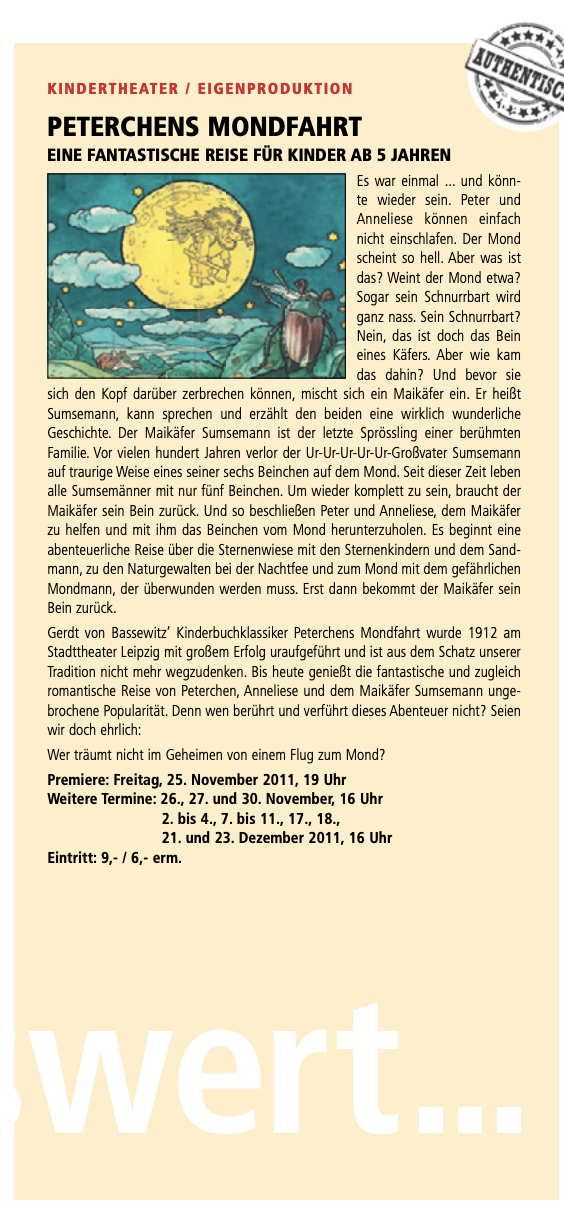
Aktivität 38. Ausgehen
A. Wie verbringen Sie Ihre Freizeit?
Read the statements below and mark down whether you and your friends ever do these Austin activities when you go out. If you are not familiar with Austin, look the places up online or just find alternatives from your area.A. Wie verbringen Sie Ihre Freizeit? Read the statements below and mark down whether you and your friends ever do these Austin activities when you go out. If you are not familiar with Austin, look the places up online or just find alternatives from your area.
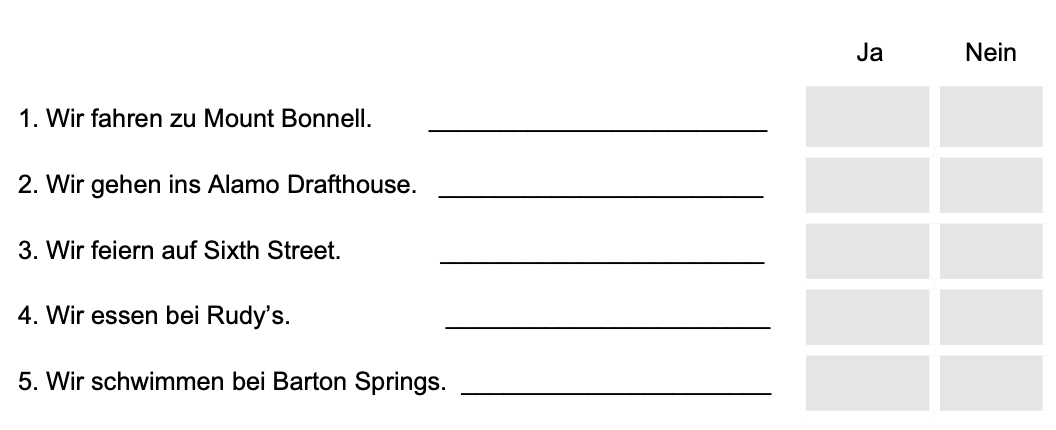
B. Warum? Warum nicht?
Now explain your reasons for responding to these statements the way you did.
Beispiel: Wir fahren zu Mount Bonnell, denn die Aussicht (view) ist abends sehr schön.
1. _______________________________________________________________________ _________________________________________________________________________
2. _______________________________________________________________________ _________________________________________________________________________
3. _______________________________________________________________________ _________________________________________________________________________
4. _______________________________________________________________________ _________________________________________________________________________
5. ____________________________________________________________________
Aktivität 39. Ausgehen in Würzburg
You already looked at some menus from restaurants in Würzburg. You have eaten, but the night is still young. Go to the following website: http://www.wuerzburg.de/. Click on „Veranstaltungskalender” (Events) and go to/expand the search form. Here you’ll be able to search for activities to do after dinner. FYI: Set the website language to German.
A. To the left you see the navigation bar. Answer the questions below about what you see.
1. What elements does the navigation provide?
2. What can you search for?
3. What categories can you choose from?
4. What categories are most useful to search for evening/night activities only?
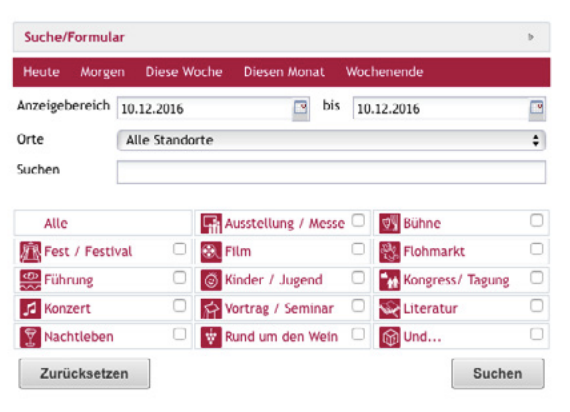
B. At home or in the lab
Go to the website http://www.wuerzburg.de/ and create your own Nachtprogramm. Write down your Nachtprogramm on a separate sheet of paper. Where are you going to go? What are you going to do? Explore the categories and what events, shows, groups, etc. are offered in Würzburg. For each thing you’d like to do/see, write down the appropriate information:
Was für ein Event/eine Veranstaltung ist es?
Wo in der Stadt ist es?
Wie heißt der Ort/die Kneipe/das Theater …?
Wie viel soll es kosten?
Warum wollen Sie hin?
C. In class
Was machst du? Talk to your partner and find out what he/she has planned. Whose Nachtprogramm is better, more fun, etc.? Or do you have the same plans?
=> Before you start the interview collect a few questions you can ask your partner.
_____________________________________________________________________
_____________________________________________________________________
_____________________________________________________________________
| Mein Nachtprogramm | Das Nachtprogramm von meinem Partner/meiner Partnerin |
Aktivität 40. Ein Dokumentarfilm: Ein langes Wochenende
Wir gratulieren!
You have been selected as a participant in a new German Reality-TV shoot-off of Deutschland sucht den Superstar (the German version of American Idol …) called Deutschland sucht die Superstudis! You have to create a 5-10-minute screenplay documentary for your audition. The topic: “How do American students at your university spend their weekend”. If you want to win, you better not limit your comments to “ich schlafe” and “ich mache meine Hausaufgaben” – not only won’t you get to remain in the contest, but just imagine the scathing comments you’d get from the show’s judges! Be creative, use as much of the new vocabulary you learned in this chapter as possible. Feel free to perform this skit to your classmates (or even make the movie)!




